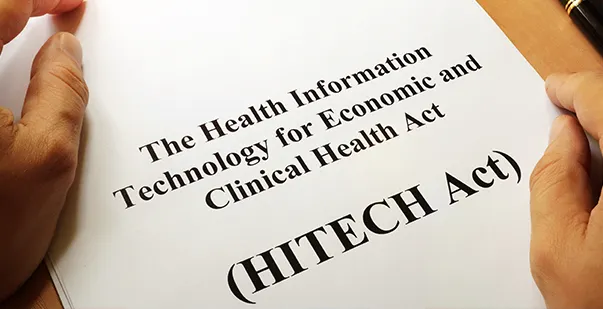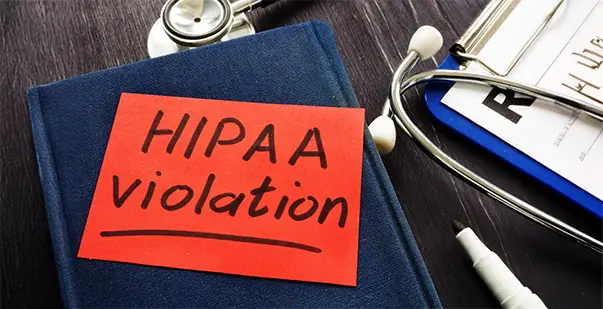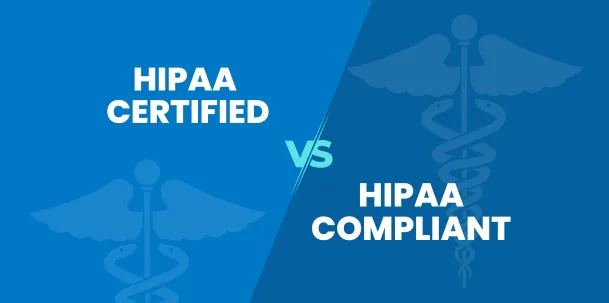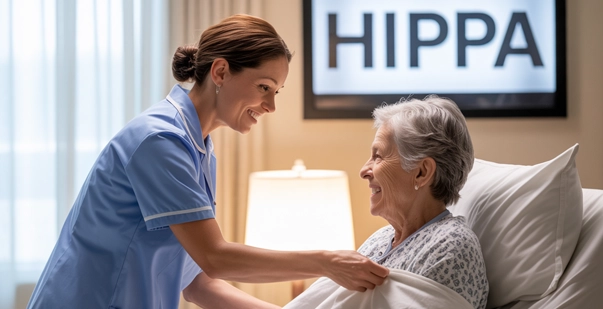You work in an assisted living facility. You know every resident by name, you chat with their families, you help coordinate doctor visits. One day, a resident’s daughter calls and asks for an update on her mom’s lab results. You’re tempted to give her the information, after all, she’s family. But in that moment, one simple answer could turn into a serious HIPAA violation.
In the U.S., HIPAA violations in long-term care settings aren’t rare. As of October 31, 2024, over 358,000 HIPAA complaints have been filed, as per the U.S. Department of Health and Human Services. Many of them involved the mishandling of patient information in everyday conversations and processes.
This guide breaks down the real mistakes assisted living facilities make, not the textbook ones, but the small, easy-to-miss errors. Some of these mistakes can lead to hefty penalties, but are you aware of what they are? If not, don’t worry, we’ve got you covered.
Read More: What Is An Assisted Living Facility? Costs, Benefits And Services
The Most Common HIPAA Mistakes in Assisted Living Facilities
Even staff with good intentions can make simple mistakes in HIPAA compliance for assisted living facilities. But these small errors can quickly turn into serious HIPAA violations and cost you hefty fines. Here are some of the most common and costly mistakes that you need to watch for in your facility:
1. Staff “Snooping” into Resident Records
Even if you don’t mean any harm, looking at a resident’s file without permission still breaks HIPAA rules. For example, UCLA once fired 13 employees for checking Britney Spears’s medical records, as reported by The New York Times. That case shows how strict the rules are. In assisted living, you might feel curious to check a neighbor’s chart or a friend’s lab results. But if it’s not part of your job, you can’t access that information. Doing so can lead to investigations, large fines, and damage to your reputation.
How to Avoid It:
Implement role-based access to electronic and paper records so staff can only see information needed for their job.
Conduct regular audits of access logs to monitor who is viewing records.
Reinforce through training that curiosity is not a valid reason to access PHI.
2. Casual Verbal PHI Sharing Among Staff or Residents
Staff may casually mention a resident’s medical status in hallways, dining rooms, or shared spaces, assuming it's harmless or even helpful. But unless proper consent has been obtained, even seemingly innocent updates breach HIPAA privacy rules. A 2022 cybersecurity study at AHIMA found that 5% of reported data breaches were due to unauthorized verbal disclosures, highlighting how everyday conversations can inadvertently compromise sensitive information.
While residents are free to discuss their health, staff cannot publicly share information about others. Shift handovers conducted within earshot of other residents, visitors, or non-involved staff are especially vulnerable moments that often go overlooked but carry serious compliance risks.
How to Avoid It:
Create private spaces for shift reports and staff handoffs.
Train staff to avoid discussing resident information in public or shared areas.
Use real-life roleplay in staff training to help staff recognize risky situations.
Post visual reminders in staff areas to discourage hallway conversations about residents.
3. Inadequate Written or Electronic Authorization
HIPAA allows for verbal permission in limited cases, but it must be properly documented and carefully scoped. Too often, staff rely on informal approvals, “the family said it was okay”, without securing proper authorization forms. This casual approach can lead to unintentional over-disclosure of PHI. Facilities should instead use standardized authorization forms that clearly state what information can be shared, with whom, and for how long. Periodic reviews of these consents help ensure ongoing privacy compliance in assisted living care situations as they evolve.
How to Avoid It:
Always use standardized authorization forms that clearly state what information can be shared, with whom, and for how long.
Train staff on when and how to obtain proper written consent.
Set up a periodic review of all authorizations on file to ensure they are current and properly documented.
4. Insecure Handling of ePHI and Physical Records
Many facilities underestimate how easy it is for protected health information to be exposed. Theft of unencrypted devices, like a lost smartphone or stolen laptop, has triggered multi-million-dollar HIPAA fines in healthcare. In assisted living, common practices like sending PHI over unencrypted emails, texts, or using consumer video apps like Skype or FaceTime for care coordination expose sensitive data to hackers. Even leaving charts or reports on unlocked desks in shared spaces leaves physical documents vulnerable to prying eyes and accidental exposure.
How to Avoid It:
Ensure all devices storing PHI are encrypted and password-protected.
Prohibit the use of personal devices and unsecured apps for care coordination.
Use HIPAA-compliant communication tools for telehealth or virtual family updates.
Always secure physical files in locked cabinets when not in use.
5. Failing to Apply “Minimum Necessary” and “Need‑to‑Know” Standards
HIPAA’s “minimum necessary” standard is often overlooked in assisted living staff compliance training settings where roles can blur. For example, a nurse aide may review full resident charts even when only basic vitals or care notes are needed. Similarly, front desk staff accessing residents' medical details beyond what’s necessary for scheduling crosses privacy boundaries. Each staff member should only access the precise information needed for their task, and role-based access controls must be enforced to ensure these boundaries stay clear.
How to Avoid It:
Establish clear role definitions and permissions for staff access to PHI.
Configure electronic health records to limit access based on job function.
Reinforce through staff training that they should only access the minimum amount of information required to do their jobs.
6. Lack of Regular Risk Assessments and Staff Training
Many assisted living facilities either delay or skip formal risk assessments, failing to identify gaps in how PHI is handled across physical, administrative, and technical systems. Without ongoing, practical staff training, employees may forget protocols or assume lax norms are acceptable. Post-incident reviews combined with scenario-based HIPAA training for caregivers refresh staff knowledge, help address recurring weak points, and significantly reduce the likelihood of repeat violations over time.
How to Avoid It:
Conduct regular HIPAA risk assessments to identify and fix vulnerabilities.
Schedule mandatory scenario-based staff training at least annually.
Hold post-incident reviews after any breach to improve processes and refresh staff understanding.
Read More: What is the HITECH Act?
Does HIPAA Even Apply to Your Facility?
Assisted living facilities (ALFs) usually don’t fall under HIPAA rules because they rarely transmit protected health information (PHI) electronically for standard healthcare transactions like billing or claims. Most residential ALFs operate as purely residential settings, so they sit outside HIPAA regulations. As of 2022, only about 48% of residential care communities use electronic health records (EHRs), according to the CDC. This means that more than half of them likely remain exempt unless they start using these systems.
But if your facility does submit claims electronically or keeps EHRs, then you are considered a covered entity. In that case, you must follow HIPAA’s Privacy and Security Rules.
Even if you’re not a covered entity, HIPAA can still apply. For example, if your ALF transmits PHI electronically for billing, or works as a business associate by handling PHI for a covered entity, such as coordinating care or sharing electronic PHI with hospitals, you are required to comply. You’ll need to have written Business Associate Agreements, strong data safeguards, regular risk assessments, and clear breach protocols in place.
Read More: Why is Compliance and Safety Critical in Healthcare?
How to Protect Electronic and Paper Health Records
Protecting health records, whether electronic or paper, comes down to doing a few things exceptionally well. Below are the 5 areas every healthcare organization must focus on:
1. Control Who Has Access
The fewer people who have access, the safer the records. Use role-based access for digital systems, ensuring staff only see what they need. For physical files, store records in locked rooms or cabinets, with strict key or card access controls. Every person who can open a chart or log into the system should be authorized, tracked, and regularly reviewed.
2. Encrypt Digital Data
Encryption turns sensitive health information into unreadable code for unauthorized users. All electronic health records should be encrypted both when stored (data at rest) and when sent (data in transit), whether that’s between servers, devices, or via email. This ensures that even if a hacker gains access, the data remains protected.
3. Monitor and Audit Activity
Tracking who accesses records, and when is essential. Digital systems should maintain audit logs that record every login, data change, or file download. For physical records, keep manual logs or surveillance in storage areas. Regularly review these logs to catch unusual or unauthorized behavior early.
4. Secure Disposal of Old Records
When records are no longer needed, they must be destroyed securely. For digital data, use data wiping software that meets NIST 800-88 standards to prevent data recovery. For paper files, cross-cut shredders or professional shredding services ensure complete destruction. Improper disposal is one of the most common ways breaches occur.
5. Train Staff and Review Policies Regularly
Human error remains one of the biggest threats. Conduct regular HIPAA training, phishing awareness, and HIPAA education for healthcare workers. Equally important: update policies as technology, regulations, and threats evolve. A well-trained, security-conscious staff is often the best defense against breaches.
Staying Clear of Costly HIPAA Violations in Assisted Living
HIPAA compliance for assisted living facilities means you need to protect resident information at every step. You must stop casual snooping, prevent public sharing of PHI, and always get proper written authorizations. It’s also your job to secure both digital and paper records. Use encryption, store records safely, control who can access them, and dispose of them properly.
Simple steps like checking authorization forms, protecting communication channels, and keeping up with staff training don’t just meet rules. They also show that your facility takes privacy and care seriously. If you want to strengthen your team’s understanding of HIPAA rules, consider enrolling in HIPAA Awareness Training for Everyone. It’s designed to help staff apply these rules confidently in real-world situations. Join today!
Commonly Asked Questions About Assisted Living & HIPAA
Even experienced facility managers and families run into situations where HIPAA rules feel confusing. Here are four common real-world questions, and clear answers that cut through the noise:
Q1: If residents talk about their health openly, is that a HIPAA violation?
A: No. HIPAA only applies to disclosures made by covered entities (like your facility or staff) and their business associates. When residents voluntarily discuss their health information with each other, it's not considered a violation.
Q2: Can staff share health updates casually during group activities or meals?
A: No. Staff cannot disclose PHI in public or shared spaces, even if it seems harmless. Saying something like “Mrs. Smith is doing better after surgery” during a meal is still a disclosure under HIPAA, and violates privacy if overheard by others not involved in care.
Q3: Our facility uses a shared, unencrypted email; are we at risk?
A: Yes. Any unencrypted or unsecured email system puts ePHI at risk. HIPAA requires using secure, encrypted communication platforms, with proper access controls and password protections, for transmitting PHI electronically.
Q4: When exactly does an assisted living provider need a BAA with a vendor?
A: A Business Associate Agreement (BAA) is required anytime a vendor or contractor handles PHI on your behalf. This includes EMR providers, billing companies, IT support, cloud storage services, or any external health professionals partnering with your facility.










